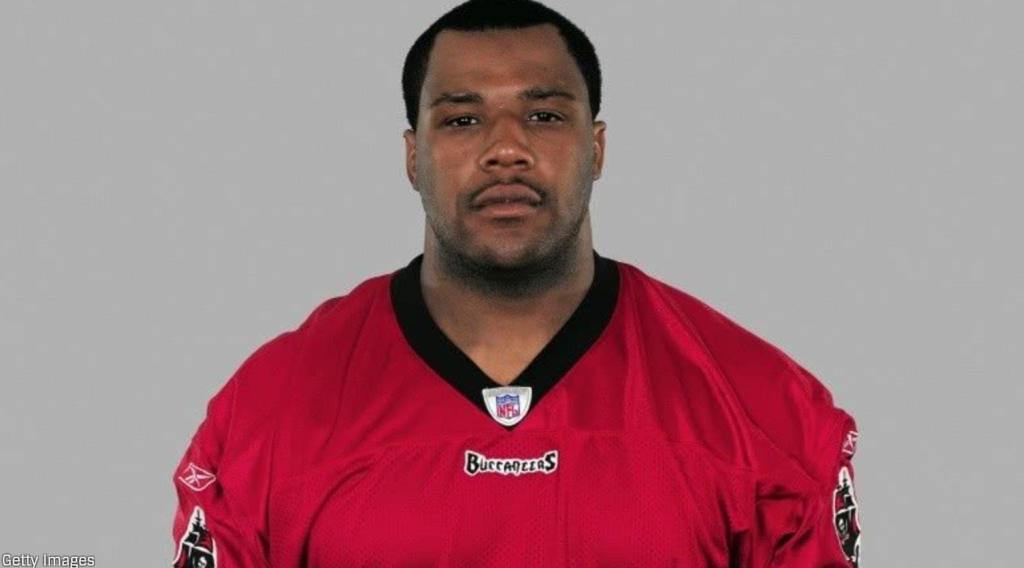
Brian Boone @brianbooone Adam James @Shasdam
It’s a hard fall from the glories of the sporting world, to the terrifying and often demeaning world of prison. Athletes like the following were at the pinnacle of their respective sports, but after a few bad decisions, are now serving hard time. It’s going to be a long time before any of these people can walk the streets and sign autographs, and some never will again.

Rae Carruth
The Carolina Panthers’ Rae Carruth was drafted in 1997 with the thought that he would be a “franchise player,” one who help the team achieve prominence in the league. Early in his career, it looked like Carruth would be just that, starting 14 of 16 games in his rookie season, with 44 catches for 545 yards resulting in four touchdowns—the most among rookie receivers.
During his time in Carolina, he developed an on-again, off-again relationship with a Charlotte woman named Cherica Adams. In late-1999, Adams became pregnant — Carruth urged her to terminate the pregnancy, but Adams wanted to keep the child. On November 16, 1999, Adams and Carruth went out to see a movie, but took separate cars. She was following him when he stopped suddenly. She stopped too, at which point, another car pulled up alongside her. The driver, Van Brett Watkins, fired five shots, four of which hit Adams. With her last bit of consciousness, she called 911. Her baby, Chancellor, had to be delivered 10 weeks early. He survived (and still lives to this day), but suffered so much blood and oxygen loss during the trauma, it caused permanent brain damage.
After a police investigation, Carruth was arrested for conspiracy to commit murder—he’d hired Watkins to kill Adams. Watkins got 40 years — Carruth was sentenced to no less than 18 years and 11 months. He’s currently the prison janitor at the Tyrell Prison Work Farm in North Carolina, and is set to be released in 2018, at the earliest. Chances are decent that he’ll be locked up for longer, however.

Oscar Pistorius
At one time, the story of Oscar Pistorius was among the most awe-inspiring in sports history. Born with a birth defect that left both of his legs without fibulas, Pistorius’s lower legs were both amputated when he was an infant. He was fitted with prosthetic legs and took up running at age 16—and just two years later, the “Blade Runner” won a gold medal at the Athens Paralympics in 2004, later competing in the 400-meter run at the 2012 London games.
Just six months later, on February 14, 2013, Pistorius was arrested in connection with the shooting death of his girlfriend, Reeva Steenkamp. As Steenkamp made preparations for Valentine’s Day, Pistorius claims he mistook her for a home invader, and shot her at their home in South Africa. Prosecution argued that the murder was premeditated, as Pistorius and Steenkamp often fought (and Pistorius had a history of violence against women). After a seven-month long trial, Pistorius was found guilty of culpable homicide (the South African legal system’s equivalent of manslaughter) and served a year in prison before being released to house arrest. But then, the Supreme Court of Appeals overturned that verdict, forced Pistorius into another trial, and this time found him guilty of murder. He’ll serve at least 15 years behind bars.

‘Fast Eddie’ Johnson
Known as “Fast Eddie,” Edward Lee Johnson Jr. was a full-fledged NBA star — averaging 15 points and 5 assists per game and shooting nearly 50 percent from the floor over 675 games. He represented the Atlanta Hawks in two consecutive NBA All-Star Games, and his explosive speed and slashing ability, in addition to an accurate outside shot, netted him a career total of 10,163 points. Life after basketball, however, would not go well for Fast Eddie. The former star completely lost control.
Described as a “habitual felon,” Johnson was convicted of sexual battery and sexual molestation of an 8-year-old girl. But Fast Eddie wasn’t new to crime, not by a long shot. He had been arrested roughly 100 times, with allegations of “burglary, battery, robbery, possession of marijuana and possession of drug paraphernalia.” Johnson’s sexual assault on an 8-year-old landed him a life sentence without the possibility of parole.
Unfortunately, another Eddie Johnson, also a retired NBA player — who seems to be an all-around good guy — has been confused for the child rapist. So keep your Eddies straight. The scumbag Eddie Johnson is locked up in Santa Rosa Correctional Institution, and he will never again be a free man.
Craig Titus and Kelly Ryan
In the world of professional bodybuilding, Craig Titus and Kelly Ryan were stars, and their arrest and conviction rocked the sport. Titus took up bodybuilding after high school and built himself up for competition, taking first place (for the first of many times) in the 1988 NPC Houston Bodybuilding Championships. Concurrent with his bodybuilding career, however, Titus lived a life of crime. In 1995 he was arrested in Louisiana for possession and intent to sell ecstasy — two years later, he was sentenced to prison for violating his parole by using steroids.
It seemed like he had left all that in the past in 2003, when he married fellow bodybuilder Kelly Ryan, who held a number of circuit wins and was a three-time Fitness Olympia runner-up. Then, in December 2005, the burned body of Melissa James, personal assistant to Titus and Ryan, was found in Ryan’s car on a road outside of Las Vegas. After avoiding police for over a week, the pair were arrested at a nail salon in Boston. The duo initially claimed that James died of a drug overdose and, fearing they’d be arrested, burned the body and abandoned it in a car and left town. However, police say James had been shot with a stun gun, been given morphine, and had been strangled to death with a wire. In 2008, Titus was sentenced to between 21 and 55 years in prison, while Ryan was given two consecutive terms of 3-13 years.

Javaris Crittenton
Javaris Crittenton had the potential to be a major NBA star. He was a standout at Southwest Atlanta Christian Academy, and put up good numbers as the starting point guard for Georgia Tech. In 2007, he was drafted in the first round by the Los Angeles Lakers, whereupon he moved to Los Angeles and celebrated his newfound fame and dream job by joining a street gang.
In 2011, Crittenton’s cousin drove him around some neighborhoods in Atlanta, looking for a rival gang member that had reportedly robbed them. Crittenton fired shots, but missed the man and instead shot and killed 22-year-old Julian Jones, an innocent bystander and mother of four. Attorneys argued that while Crittenton was actively participating in a drive-by shooting, he shot Jones by accident. Because he had intended to shoot the man he claimed that robbed him, Jones’s murder wasn’t premeditated, Crittenton’s lawyers actually argued. Amazingly, the judge reduced the charge from murder to manslaughter. As part of that deal, Crittenton plead guilty and was sentenced to 23 years in prison.

Mel Hall
Mell Hall started playing pro ball for the Cubbies in 1981 and enjoyed a successful first full season in 1983, where he batted a respectable .283, smacked 17 homers, drove in 56 runs, and finished third in National League Rookie of the Year voting. He then played for the Cleveland Indians and New York Yankees before heading to Japan to play ball on a two-year, $4 million deal. When it was all said and done, Hall had a very respectable baseball career as an above-average left-fielder.
Unfortunately, he wasn’t done making headlines. In 2009, Hall was convicted of three counts of aggravated sexual assault and two counts of indecency with a child after raping a 12-year-old girl who played on the youth basketball team he coached. A jury found him guilty, and Hall was sentenced to 40 years in prison, with the need to serve 22.5 years before becoming eligible for parole. Defense attorney Brady Wyatt didn’t agree with the call, stating “For all the good this man has done in his life, it seems like this was an excessive verdict.” That’s right! Playing professional games and mentoring other athletes is really more worthwhile than keeping a child rapist in prison a little longer. Multiple individuals testified against the former baseball player, claiming that — in addition to his rape charge — he often acted inappropriately and had even lived with a 15-year-old girlfriend for several years, according to SB Nation.
Hall is currently locked up in a Texas prison, and won’t be going anywhere anytime soon.

Darren Sharper
One of the most high-profile professional athletes currently serving time is former broadcaster and five-time Pro Bowl NFL safety Darren Sharper. A member of the NFL’s 2000s All Decade Team, Sharper enjoyed a highly successful collegiate and professional career. After retiring from the game, Sharper took on new activities, including working as an analyst for NFL Network and, unfortunately, the serial drugging and raping of “as many as 16 women in four states.”
In August 2016, Sharper pleaded guilty or no contest in federal court and in four different state courts. A 15-page statement signed as part of the former Pro Bowler’s plea deal states he or a former cop, Brandon Licciardi, would drug women with sedatives or anti-anxiety medication so Sharper could rape them. Sharper received a light sentence of 20 years by a Louisiana state judge after being sentenced to more than 18 years by a federal judge. Unbelievably, the high-profile athlete’s multi-jurisdictional plea deal previously only called for nine years of incarceration — though, luckily, that was ultimately recognized as atrociously light.
Sharper is serving his time under federal custody, with some people, like Sports Illustrated’s Peter King, arguing he should still be in the Hall of Fame — because football achievements trump being a serial rapist, apparently.

David Megget
As kickoff and punt returner in the NFL, David Meggett amassed the most yards on punt returns in the entire NFL—in his rookie season (1989-90). Along with 531 receiving yards and 117 rushing yards, that earned him a berth in the Pro Bowl. In his second season (1990-91), he once more lead the league in punt return yardage and won a Super Bowl as a member of the New York Giants. He continued to put up big rushing and return numbers with various teams, all the way until he retired in 1998.
After his playing days, he built up a troubling rap sheet: he was arrested in Toronto for assaulting an escort, resigned as a Parks Director in North Carolina after being accused of assaulting an ex-girlfriend, for which he was convicted of misdemeanor sexual battery and received two years of probation. Then, in January 2009, he was charged with burglary and criminal sexual conduct. Authorities say Meggett raped a college student at her home in South Carolina (which he claims was consensual, as she was paying back a debt with sexual favors). The plaintiff argued that she indeed owed Meggett $200 at the time of the crime, but awoke in the middle of the night to find him standing in her bedroom saying he “wanted a down payment.” For this crime, Meggett was sentenced to a maximum of 30 years in prison.

Darryl Henley
A Los Angeles native, Henley was a star cornerback at UCLA, where he was a consensus All American in 1988. He turned pro in 1989, drafted by the Los Angeles Rams, for whom he was defensive Rookie of the Year and in their starting lineup for six years. Henley took the field for the Rams’ last California game in December 1994, before the team moved to St. Louis.
That would also turn out to be Henley’s last football game, period. In 1995, Henley was one of four defendants convicted in a cocaine trafficking case—Henley claims only to have financed the criminal doings of childhood friend. While in jail awaiting sentencing, he convinced a guard to smuggle him a cell phone (which wasn’t easy in 1995, because they were huge back then). Henley used that phone to conduct business, like hiring a hitman to kill the presiding judge at his cocaine trafficking trial, and a Rams cheerleader who had testified against Henley. This, for the record, is not how you show the world you’re merely an innocent money man.
Ultimately, neither hit came through: Federal agents had secretly tape-recorded Henley in his cell talking about the $100,000 hit jobs. In summer ’96, Henley stood trial for a brand new slew of charges (13 in all) — as part of a plea deal, he admitted guilt to two counts of conspiracy to commit murder, and one count of bribing a guard. The other ten charges were dropped, but Henley was still sentenced to an incredibly long amount of prison time: 41 years, with no chance of parole. That’s not much of a “plea,” considering he won’t get out until he’s 70, but it’s better than the alternative: getting out when he’s ready to be buried.

Clifford Etienne
Before sports, Clifford Etienne was basically a dumb high school kid, who held up some customers at a shopping mall, mostly because. Though 17, Etienne was tried as an adult and received a 40-year sentence. While behind bars, Etienne took up boxing and amassed a 30-0 record, en route to becoming the champion of the Louisiana state prison’s boxing circuit (which is a thing).
With good behavior, Etienne’s sentence was cut way down to 10 years, and he immediately went pro upon his 1998 parole. Etienne rose through the boxing ranks faster than Little Mac from Mike Tyson’s Punch-Out, winning 19 of his first 20 fights and compiling a 24-1-1 record by 2003. His status as a rising star was tarnished somewhat in 2003, however, after Mike Tyson proved tougher than his videogame counterpart, knocking out Etienne just 49 seconds into the first round of their heavily publicized bout.
Etienne continued boxing over the next two years, but was soon back to his old criminal ways. In August 2005, Etienne broke into a check-cashing place in Baton Rouge, Louisiana, and stole $1,900. To get away, he tried to steal a car with two kids inside. When that didn’t work, he stole another car … which also had two children inside. He didn’t get far before he wrecked this one and, with police catching up to him, he fired his gun, which malfunctioned.
He didn’t give his lawyers much to work with: they argued that Etienne was so high on drugs he wasn’t aware of his actions, and that he’d also suffered brain damage from his boxing career. The excuses didn’t work (and the whole endangering-kids thing didn’t help, either): In 2006, Etienne was sentenced to more than 150 years in prison, although in 2013 it was reduced to a mere 105 years behind bars, the lucky duck. He reportedly spends most of his time these days not boxing, but painting. One of his pieces even hangs in a New Orleans police precinct, which is only slightly less bewildering than the police chief who nagged Charles Manson jamming to his music while clacking away at paperwork.

Michael Nunn
It’s not just the heavyweight boxers that get all the accolades and turn to a life of crime after retirement. Take Nunn, the IBF middleweight champion from 1988 to 1991, and the WBA super-middleweight champ from 1992 to 1994. He retired in 2002 with a record of 58-4, including 37 knockouts.
He quickly found something to do with himself, not that he should have. In August of that year, Nunn met up with a man he thought was a drug dealer at a hotel in Davenport, Iowa. Nunn gave the man $200 for a kilo of cocaine, which was a real steal, because that much coke had an estimated street value of about $24,000. Turns out that wasn’t the most generous dealer of all time, but rather an undercover federal agent. You know what they say about things seeming too good to be true.
Nunn was arrested and plead guilty to conspiracy to distribute cocaine. His sentence: 24 years in federal prison, which means a release date of somewhere around 2028. Even though it was just one count, the judge delivered such a big sentence after witness testimony revealed that Nunn had probably been dealing drugs for almost a decade. Choose your after-work hobbies wisely, kids.

Stanley Wilson
A star running back at the University of Oklahoma, Wilson was selected in the ninth round of the 1983 NFL Draft by the Cincinnati Bengals. He wasn’t as solid a pro as his college career indicated he’d be, but that was mainly because he struggled greatly with an addiction to cocaine.
Being a famous guy didn’t help at all. For violating the NFL’s drug policy, he was suspended for the entirety of the 1985 season … and then the 1987 season, too. Fortunately, he made it back to the Bengals in 1988, rushing for 398 yards, and helping his team reach the Super Bowl. They lost, 20-16, but perhaps it would have gone the Bengals’ way had Wilson actually played in the game.
Thing is, he didn’t, and it’s his own damn fault. The night before the Super Bowl, Wilson was caught by a Bengals coach high on cocaine (with powder all over his nose) in a hotel bathroom. That was Wilson’s third violation under the NFL’s “three strikes and you’re out” rule, so he was banned for life. Continuing to be haunted by drug and mental health issues throughout the ’90s, Wilson finished the decade by robbing a house and stealing an estimated $130,000 worth of jewelry, cameras, and other valuables from a house in Beverly Hills.
Wilson had already served time for breaking into two houses in Long Beach, so he was sentenced harshly under the state of California’s “three strikes and you’re out rule.” His 1999 sentence was for 23 years, so he’s scheduled for parole in 2022. That’s twice a third strike cost him dearly — we’re guessing he doesn’t watch a lot of baseball in the prison lounge.

Sam Hurd
Wide receiver Sam Hurd spent six years with both the Dallas Cowboys (where he was special teams captain) and the Chicago Bears, amassing a respectable 53 receptions and 739 receiving yards. He stayed busy off the field too, hosting a Dallas Cowboys radio show (and then a TV show) called Inside the Huddle.
Another one of his pastimes: drug trafficking. In 2011, he was arrested outside a Chicago steakhouse, when he received a kilogram of cocaine from an undercover officer. That same night, he reportedly told the officer—whom he thought was a drug distributor—that he wanted to buy up to 10 kilograms of cocaine and 1,000 pounds of marijuana on a weekly basis. It clearly wasn’t all for him, since in 2013, he received a 15-year prison term for being part of a group that was trying to set up a three-state cocaine and marijuana distribution ring.

O.J. Simpson
As the focal point of the biggest trial of a professional athlete in history, O.J. Simpson has been serving time for the past decade in Lovelock Correction Center, a prison just outside Reno, on a 9- to 33-year sentence for first-degree kidnapping, armed robbery, and conspiracy to commit a violent crime. Of course, those charges have nothing to do with the “trial of the century,” in which Simpson was acquitted of charges following the murder of his ex-wife, Nicole Brown Simpson, and her friend Ron Goldman. No, the former Heisman Trophy winner is locked up for robbing a Las Vegas casino hotel room apparently to reclaim personal memorabilia from a pair of collectible dealers.
Before becoming a household name in connection to the wrongful deaths of Nicole Brown Simpson and Goldman — for which a civil court ruled against O.J. Simpson, awarding the victims’ families $33.5 million — O.J. Simpson was a collegiate and professional superstar. As a running back for USC, he won the Heisman Trophy in 1968 and then became the first NFL player to rush for over 2,000 yards in a single season. He was inducted into both the College Football Hall of Fame and Pro Football Hall of Fame, in 1983 and 1985, respectively.
Simpson will have a parole hearing in July 2017. Should the allegedly-not-murderer’s parole be denied, he will have to wait until 2022 to get another chance at parole, at which point he’ll be 75 years old.
Mark “Gator” Rogowski
As a teenager living in California in the 1980s, Rogowski was in the right place at the right time, and with the right skills: He was among the first wave of professional skateboarders who brought mainstream attention to the sport. By age 14, he was winning competitions around the state, and by 17, was earning more than $100,000 a year in winnings and endorsements, including the bestselling signature Gator board, designed for him by boardmaker Vision.
But while cohorts like Tony Hawk became legends, Rogowski self-destructed, drinking and partying hard … and then, things got really dark. In 1991, shortly after his girlfriend broke up with him, he ran into a woman named Jessica Bergsten, a friend of his ex whom he hadn’t seen in awhile. He later said that Bergsten reminded him too much of his ex—and that’s why he severely beat her, then sexually assaulted and strangled her to death. Rogowski left her body in a surfboard bag and buried her in the California desert. Rogowski was later sentenced to 31 years to life, but is eligible for parole. He was denied it in 2011, however, and we don’t expect him to get the greenlight to freedom anytime soon.
Eric Naposki
Linebacker Eric Naposki signed with the New England Patriots in 1988, playing there before being traded to the Indianapolis Colts. He got a lot more playing time when he switched over to the World League of American Football (later renamed NFL Europe), helping lead the awesomely-named Barcelona Dragons to a World Bowl title in 1997.
But since 2011, he’s spent his post-playing days behind bars for a crime committed way back in 1994. At that time, he was seeing a woman named Nanette Packard, who was also dating a man named William McLaughlin. She was the beneficiary of McLaughlin’s $1 million life insurance policy, which paid out when he was found dead in his home, shot six times. Packard was charged and imprisoned (she’d written herself hundreds of checks out of McLaughlin’s account, which is the reddest of red flags), but police lacked evidence to definitively tie Naposki to the murder. However, they later discovered new evidence linking Naposki to the killings. He was charged in 2009 with being the trigger man, convicted, and in 2011 was sentenced to life without parole.

Keith Wright
Defensive tackle Keith Wright was a sixth-round draft pick out of the University of Missouri who bounced around the NFL a lot, with stints in Houston (who signed him to a $925,000 three-year contract), Indianapolis, Tampa Bay, Arizona, and Detroit. After some time with the Hamburg Sea Devils of NFL Europe, he returned home to northern California and finished flushing his career down the toilet with a slew of crimes—police linked him to three home invasions in 2011 alone.
In all, Wright rung up 19 felony charges over his spree, including kidnapping, armed robbery, false imprisonment, and sexual assault. Each charge involved robbery, and one involved a sexual assault. A year later, he was given one of the largest sentences a former professional athlete ever faced (heck, that anybody ever faced): 234 years (and eight months, just so he really learns his lesson). The judge also required him to pay restitution and court costs, if he had any of his NFL money left over.



